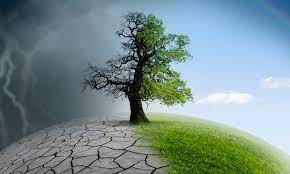Noor Zia
Climate change has become one of the most threatening and undeniable challenges of the time. We see that the climate is rapidly changing, and the risky consequences are evident. From rising temperature to severe weather condition, the impacts of climate change are felt worldwide.
The temperature of the earth significantly increases with time. The temperature in September is the same as that in June and July. Outside, we see everyone’s clothes wet, showing terribly hot weather. Our planet is heating up at an alarming rate, and it is the result of human activities as well as natural processes.
Humans as contributors to climate change:
Humans burn fossil fuels such as coal, oil, and natural gases. This results in the emission of greenhouse gases to the earth, particularly carbon dioxide (CO2). This gas traps heat from the sun and result in global warming.
Furthermore, deforestation is another cause of global warming. Trees and forests are called carbon sinks. They absorb and store CO2 from the atmosphere. The cutting down of trees in living areas and especially in forests for agriculture, making fires in villages, and urban development reduce the earth’s capacity to absorb CO2.
Besides burning fossil fuels and deforestation, industrial processes also contribute to climate change. Various industrial processes release greenhouse gases such as methane and nitrous oxide. Both absorb infrared radiation from the earth and then re-emit back to it. Their increased concentration enhances the greenhouse effect, increases global temperature and contributing to climate change.
Moreover, agriculture is also one of the contributors to climate change. Artificial fertilizers release nitrous oxide, and livestock farming produces methane. Both are greenhouse gases and result in a temperature rise. In addition, converting forests into farmlands releases stored carbon, resulting in warming the earth.
Transportation is also a source of global warming. The combustion of fossil fuels in cars, trucks, and trains emits CO2, heating the earth. Natural factors such as volcanic eruption, ocean currents, and solar variation also contribute to climate change, but the current rate of climate change is due to human activities such as the burning of fossil fuels, deforestation, etc.
Hence, climate change is a stark reality that demands immediate action. It affects not only humans but ecosystems and economies as well. The responsibility of mitigating climate change falls on everyone’s shoulders. Human activities contribute more to climate change then it requires combined efforts at individual, community, and government levels. Adopting sustainable practices, renewable energy sources, reforestation, and improving energy efficiency are some steps that can help mitigate climate change and limit its coming consequences.
The writer is student of 8th Semester at Department of English, Islamia College University Peshawar.







